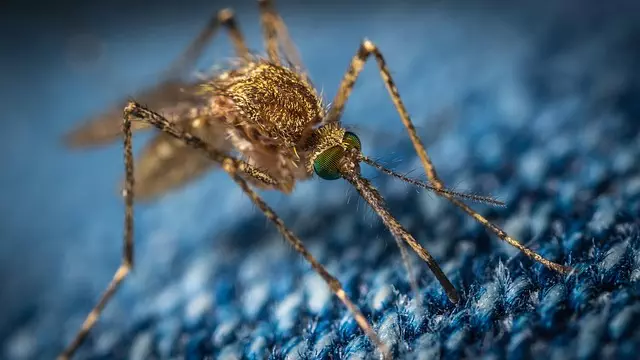Mosquitoes pose significant global health threats by transmitting diseases like malaria, dengue fever, Zika virus, and West Nile virus, emphasizing the need for effective Mosquito Control. Seasonal changes impact mosquito breeding and dynamics, making year-round strategies crucial. Modern Mosquito Control shifts from pesticides to integrated approaches, including biological controls and habitat manipulation, aiming for eco-friendly solutions. Same-day services offer immediate relief from infestations through targeted treatments, while future innovations like drone technology and genetic engineering promise more sustainable management.
“Mosquitoes, beyond being a nuisance, pose significant global health risks through disease transmission. This article delves into the intricate world of mosquito control, exploring both traditional methods and emerging eco-friendly solutions. We spotlight the rapid response offered by same-day mosquito services, providing a comprehensive guide from preparation to implementation. Additionally, we analyze seasonal trends, the challenges of immediate control, and future innovations in mosquito management, empowering readers with knowledge for effective mosquito control.”
Understanding Mosquito-Borne Diseases: A Global Concern

Mosquitoes, though often considered mere nuisances during summer evenings, pose a significant global health concern. They are vectors for various diseases, including malaria, dengue fever, Zika virus, and West Nile virus. These maladies affect millions worldwide, leading to severe illness, disability, and even death. Understanding the risks associated with mosquito bites is crucial in implementing effective Mosquito Control measures.
Mosquito-borne diseases have far-reaching impacts, affecting not only individuals but entire communities. With international travel and migration on the rise, these diseases can quickly spread across borders. As such, prompt action and robust Mosquito Control strategies are essential to protect public health and safeguard vulnerable populations.
The Impact of Seasonal Changes on Mosquito Populations

Mosquito populations are highly influenced by seasonal changes, which play a significant role in their lifecycle and overall abundance. In warmer months, mosquitoes breed rapidly due to increased water availability and longer days, leading to higher numbers. This is particularly noticeable in regions with accessible standing waters, such as ponds, marshes, or even discarded tires, where they lay their eggs. As temperatures rise, so does their metabolic rate, causing a surge in adult mosquito activity.
Seasonal variations also disrupt the balance of natural predators and parasites that control mosquito populations. For instance, bat species that feed on mosquitoes are more active during warmer seasons, helping to keep their numbers in check. However, as seasons change, these predators may face challenges, such as shifts in food availability or migration patterns, impacting their effectiveness in mosquito control. Understanding these seasonal dynamics is crucial for implementing effective mosquito control strategies, ensuring a comfortable and healthy environment for residents throughout the year.
Traditional Mosquito Control Methods: Pesticides and Their Effectiveness

Mosquito control has evolved significantly over time, and while traditional methods like pesticide applications still play a role, they often face challenges in terms of effectiveness and environmental impact. Pesticides, including insecticides and repellents, have been used for decades to manage mosquito populations. These chemicals target mosquitoes directly or disrupt their behavior by altering their sensory systems. However, the effectiveness of pesticides is influenced by various factors such as weather conditions, time of day, and the specific species of mosquitoes present. Additionally, overuse or improper application can lead to resistance in mosquito populations, rendering these treatments less efficient over time.
Moreover, relying solely on pesticides raises environmental concerns due to their potential harm to non-target organisms, including beneficial insects, birds, and aquatic life. There is a growing emphasis on integrated mosquito management (IMM), which involves a combination of strategies, including biological controls, habitat manipulation, and community participation, in addition to targeted pesticide applications when necessary. This approach aims to create a more sustainable and eco-friendly framework for mosquito control, addressing the limitations of traditional pesticide-only methods.
Emergence of Natural and Eco-Friendly Mosquito Solutions

In recent years, the mosquito control landscape has seen a notable shift towards more natural and eco-friendly solutions. Traditional methods, often involving chemical pesticides, have raised environmental and health concerns, prompting researchers and pest management professionals to explore alternative approaches. Today, there’s a growing emphasis on integrated pest management (IPM) strategies that harness the power of nature itself to combat mosquito populations.
These innovative solutions range from introducing natural predators like bats and fish to treating water bodies with biological agents that target specific mosquito stages. Additionally, the use of plants with natural mosquito-repelling properties, such as citronella and lavender, has gained traction in both residential and commercial settings. As environmental awareness continues to rise, these eco-friendly mosquito control methods offer a more sustainable and safer approach to managing these pesky insects, promoting harmony between humans and nature.
Same-Day Mosquito Service: A Rapid Response Approach

Same-day mosquito services offer a rapid response approach to mosquito control, addressing immediate concerns for both residential and commercial areas. This service is designed to provide quick relief from mosquito infestations, ensuring that properties are free from these pesky insects as soon as possible. With same-day availability, homeowners and business owners can expect swift action, utilizing advanced techniques and eco-friendly products to eliminate mosquitoes effectively.
By employing a team of trained professionals, these services guarantee a thorough assessment of the infestation and implement tailored solutions. From identifying breeding grounds to applying targeted treatments, the goal is to disrupt mosquito populations and create an unwelcoming environment for them. Same-day service providers understand the importance of swift intervention in preventing the spread of diseases carried by mosquitoes, ensuring a healthier and more comfortable living or working space.
How to Prepare for a Same-Day Mosquito Treatment

Before scheduling same-day mosquito treatment, there are several preparation steps to ensure optimal results for your Mosquito Control efforts. First, identify and eliminate standing water sources around your property, as this is where mosquitoes breed. Empty flowerpots, birdbaths, buckets, and other containers that may collect water. Second, trim back overgrown vegetation and mow lawns regularly to reduce mosquito hiding spots and breeding grounds.
On the day of treatment, ensure all family members and pets stay indoors during the service window to minimize direct contact with pesticides. Remove any outdoor furniture or decorations that might block access to target areas. Keep windows and doors closed (if possible) to prevent treated mosquitoes from re-entering your home. Lastly, be prepared to follow any specific instructions provided by the mosquito control service, such as removing clothing or washing pets after treatment, to ensure the effectiveness of the Mosquito Control measures.
The Step-by-Step Process of Same-Day Mosquito Services

Same-day mosquito services offer a swift solution to those dealing with an immediate mosquito problem. Here’s how it works:
1. Initial Assessment: A specialist will begin by evaluating your property, identifying mosquito breeding grounds, and understanding the extent of the infestation. They may use tools like moisture meters and visual inspections to pinpoint potential areas where mosquitoes are laying eggs. This step is crucial for an effective treatment plan.
2. Treatment Application: Once the assessment is complete, the expert will proceed with the treatment. This typically involves targeted spraying of mosquito-repellent chemicals, larvicides, or the use of natural, environmentally friendly solutions. The application method may vary depending on the severity of the issue and the types of mosquitoes present. For instance, for adult mosquitoes, a spray can effectively reduce their population, while for larvae, larvicides are applied to water sources where they breed.
Benefits and Challenges of Implementing Immediate Mosquito Control

Implementing same-day mosquito control services offers several significant advantages for both residents and local authorities. One of the key benefits is the rapid relief it provides from mosquito-borne diseases, which can be a pressing issue in areas with high insect populations. Immediate control measures help reduce the risk of infections by minimizing mosquito activity, especially during peak biting times, ensuring safer outdoor activities and improved public health.
However, there are challenges to consider as well. Same-day services require efficient and well-organized teams capable of swift deployment, which can be logistically demanding. Ensuring immediate access to treatment areas might also conflict with other emergency response needs. Despite these challenges, the benefits of quick mosquito control actions make it a valuable addition to any community’s pest management strategy.
Future Trends in Mosquito Management: Innovations to Watch

The future of mosquito control is bright, with innovative technologies and strategies emerging to combat these pesky vectors. One promising trend is the integration of drones in pest management. Equipped with advanced sensors and targeted treatments, drones can efficiently dispense insecticides over large areas, ensuring faster and more precise Mosquito Control. This method is especially beneficial for hard-to-reach zones and can significantly reduce the reliance on chemical sprays.
Additionally, genetic engineering and biological control agents are gaining traction. Researchers are developing genetically modified mosquitoes that either reduce their population or carry bacteria that inhibit their development. These bio-control methods offer a more eco-friendly approach to mosquito management, targeting specific species while minimizing harm to non-target organisms. With ongoing advancements in these areas, the battle against mosquitoes is set to become more effective and sustainable.
